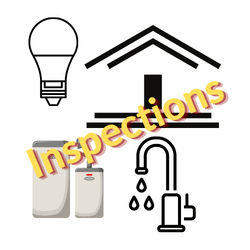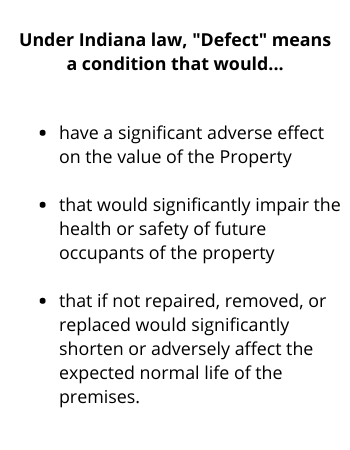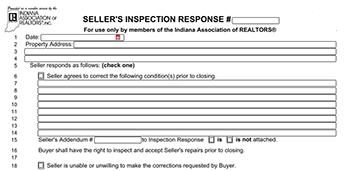A Seller Inspection Response is one of the most feared points in the listing and selling process. It’s the fear of the unknown – what’s wrong with your home and what will the buyer ask to be repaired? It has kept lots of sellers up at night going through different scenarios.
First of all, BREATHE! We will get through this.
Let’s take a look at the process and what you need to know. That always makes me feel better!

What are Inspection Types?
In Indiana, once you are under contract to sell your home, the buyer will order inspection(s). They can order any/all they want, including inspections their Lender needs for the type of loan they are using.
They have a deadline to send you an Inspection Response, as laid out in the Purchase Agreement, so they usually order them right away!
 Typical Inspections:
Typical Inspections:
- Whole House
- Pest
- Well/Septic Distance Report
- Well Water Test
- Septic Inspection
Some loans do require certain tests as part of the approval process. Usually, the cost for these inspections fall onto the buyer. However. a VA Loan will require the Seller to get and pay for a Termite Inspection Report. This is not too expensive and is part of the service a VA Loan offers for its Veterans.
Whole House Inspection
A whole house inspection will look at everything in your home – HVAC, roof, plumbing, electrical, foundation, safety issues, biological growth, etc…
Pest Inspection
A Pest inspection will look for termites, carpenter ants and any other “pest” infestations or damage and report it to the buyer. If sellers have their home treated regularly, issues are unlikely. However, if its been a while since you had a treatment or evaluation, the report may expose issues that will need to be taken care of.
Well/Septic Distance Inspection
For USDA and FHA Loans and if your home is on well and septic, there are some guidelines that will have to be verified by a professional. For existing homes, both of these loans require:
- Both should be 10 ft from the Property Line
- If the homes’ Property line is adjacent to residential Property then local well distance requirements prevail.
- If the homes’ Property is adjacent to non-residential Property or roadway, there needs to be a separation distance of at least 10 feet from the property line.
- Distance between Well and Septic Tank – 50 feet
- Distance between Well and Septic Drain field – 100 feet
- Septic tank drain field reduced to 75 feet if allowed by local authority
A professional will draw a sketch once each of the components are located and turn it in to the buyer/lender with their report.
Well Water Test
This is always a good idea when a home is on a well and is required by most government backed loans. The inspector will take a water sample and have it tested at a lab for contaminants and issue a report of the findings.
Septic Test
There are different types of tests for septic systems but a common one is a dye test. This is when a dye is put into the system through the home (think toilet) and then water is run to see if the dye turns up in the yard or a nearby body of water.
If the dye does show up, the septic system is in failure and more investigation is needed to see where the problem lies. Typically, this type of test is ordered when an appraiser for a government backed loan sees probable cause. The appraiser will make it a “condition” of the appraisal report.
Some buyers just want to have the test when a septic is used on the property.
What Happens After Inspections?
 Once the inspections are complete, the inspector(s) will send a report with the results to the buyer. From there, the Buyer’s Agent will work with the buyers to formulate their response.
Once the inspections are complete, the inspector(s) will send a report with the results to the buyer. From there, the Buyer’s Agent will work with the buyers to formulate their response.
They could:
- Ask for repairs of certain items
- Ask for checks to be made out to contractor’s at closing and take care of the repairs themselves
- Accept the property in its current condition (this is rare for non-investor buyers
One thing to note, in Indiana, they can’t just walk away without giving the seller the opportunity to remedy. On line 219 of the Indiana Association of Realtors Purchase agreement states:
“E. IF DEFECT IS IDENTIFIED: If an Inspection Report reveals a DEFECT(S) with the Property, the Buyer must:
1. Provide the inspection report, or relevant parts thereof, to the Seller; and
2. Give the Seller the opportunity to remedy the defect(s).
This protects you from a buyer backing out after just reading the report. It’s no guarantee that we will come to terms but it stops the knee-jerk reaction some buyers have after receiving their reports.
Once they present their response, we will have a time limit to respond to them.
Seller Inspection Response
 We are now on the clock to formulate a response to them. The Seller Inspection Response allows for you to:
We are now on the clock to formulate a response to them. The Seller Inspection Response allows for you to:
- Accept the buyer’s response, as is
- Counter the buyer’s response
- Or reject the buyer’s response, (line 16 off the Seller Inspection Response – Seller is unable or unwilling to make the corrections requested by the buyer) which usually means a mutual release for everyone from the purchase agreement
How to Respond
First, we don’t know what we don’t know. I’m not a contractor so the best course of action prior to responding is to get quotes from the appropriate contractors for the repairs requested. At least then, we know what we are talking about money wise.
Keep in mind, it is totally normal for repairs to be in the range of 1% to 3% of the purchase price. Again, no home is perfect – not even a newly built home!
Once we have the approximate cost to repair, we can respond to the buyers.
- If the repairs are reasonable, we just accept. Then you will be tasked with getting all the repairs completed with receipts as proof.
- We can offer a set amount to be paid at closing in the form of a check to the buyer’s choice of contractor(s.) They will make the repairs after closing.
- We can counter the repairs requested with the ones you are willing to make.
- We can use line 16 of the Seller Inspection Response to end the negotiations and put your home back on the market.
A couple of caveats to the above… if a repair is a “defect” as defined by the state of Indiana, it’s a good idea to agree to fix. It will probably come up on any/all inspectors reports and it has to be disclosed once you know about it anyway.
Sometimes, buyers ask for repairs that are not considered “defects.” Then, it’s up to you whether to entertain the repair or not. They can always ask!
The home selling process will start all over again if you refuse to make repairs. That means, we will have to get a fully executed mutual release signed by everyone before you will be able to legally accept another offer. Otherwise, you could be under contract to sell your home twice and that’s not happening!
That last option will most likely add 40+ days to the home selling journey. We have to go back on the market, allow more showings and receive another offer.
When a home goes back on the market after having pended once, buyers and agents are leery of it. They can think something is wrong with it… even if it’s not a big deal.
For Seller Inspection Response, Keep In Mind…
Buying a home is a very emotional experience. People buy due to emotion.
The same emotion that had them fall in love with the house, can also freak them out when they receive a 50+ page, typical inspection report.
“A bird in the hand…” is what my daddy used to say! Meaning, we will work hard to come to an agreement with the current buyers that everyone is happy with. It’s a Win-Win that way!
If not, we will use my “Back on the Market” marketing plan to entice a new offer. One way or another, we will complete the story of successfully selling your home!




